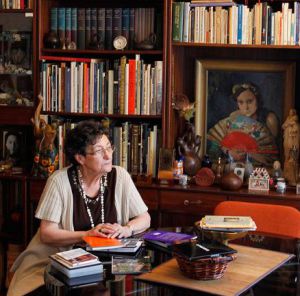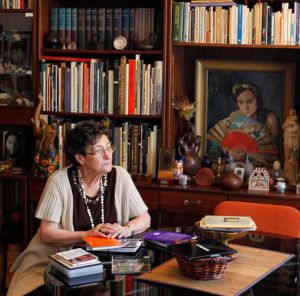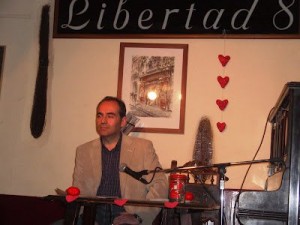Nana del desperdicio de la tristeza
Al abrigo de la arboleda de Soto del Real
y cerca de María Fernanda y Emilio Barrachina
Tengo delante de los ojos
el asombro de la arboleda
que me abraza.
Miro los fresnos susurrantes,
los callados abetos,
los sauces melancólicos
y no sé bien qué hacer
con el desperdicio intangible
que llamamos tristeza.
La tristeza es quizás
el mejor animal de compañía,
la fiera más doméstica,
pero también la más hambrienta.
La tristeza es un hueco que nos sigue
y que al menor descuido nos alcanza,
se sitúa delante de nosotros
y nos canta su nana de desdichas,
su lamento de fiera abandonada,
su machacona relación de oprobios,
su quejido de bicho que se empeña
en pegarse a nosotros
y decirnos
que no la abandonemos
a su suerte,
que nuestra obligación es adoptarla.
El viejo desperdicio de la pena,
tan opaco y radiante a un mismo tiempo,
nos va reconociendo con su hocico
y nos lame las manos con su lengua
y se acurruca manso a nuestro lado:
conoce palmo a palmo
el territorio.
Sus lágrimas nos lavan con modestia,
mientras el animal nos sigue terco,
con la amable seguridad
que da el abismo.
***
LULLABY FOR SADNESS
Sheltered by the Soto del Real grove
and close to María Fernanda y Emilio Barrachina
Before my eyes stands
the sheltering grove´s amazement
which embraces me.
I look at the whispering ash trees,
the still firs,
the melancholic willows
and am at a loss
with the intangible remains
we call sadness.
Sadness is perhaps
the best pet to keep you company,
the most domestic beast,
but also the most ravenous.
Sadness is a vacuum that pursues us
that leaps out on us unawares
to confront us
to lull us with its lullaby of wretchedness,
its lament of a forsaken beast,
and its monotonous list of injuries,
its plaintive creature´s groan insisting
in attaching itself to us
and imploring us
not to abandon it
to its fate,
that it is our duty to adopt it.
The old remnant of sorrow,
so opaque and bright at the same time
that starts by recognition through nose
then the licking of hands with tongue
tamely curling up at our side:
bit by bit it takes hold
of the land.
Meekly its tears wash us
whilst the beast pursues us stubbornly,
with that gentle assurance
offered to us by the abyss.
***
Translated by Robin Ouzman Hislop & Amparo Arrospide
***
Francisca Aguirre was born in 1930 in Alicante, Spain, and fled with her family to France at the end of the Spanish Civil War, where they lived in political exile. When the Germans invaded Paris in 1942, her family was forced to return to Spain, where her father, painter Lorenzo Aguirre, was subsequently murdered by Francisco Franco’s regime. Aguirre published Ítaca (1972), currently available in English (Ithaca [2004]), when she was 42 years old. Her work has garnered much critical success, winning the Leopoldo Panero, Premio Ciudad de Irún, and Premio Galliana, among other literary prizes. Aguirre is married to the poet Félix Grande and is the mother of poet Guadalupe Grande.
Robin Ouzman Hislop (UK) Co-editor of the 12 year running on line monthly poetry journal Poetry Life and Times. (See its Wikipedia entry at http://en.wikipedia.org/wiki/Poetry_Life_and_Times). He has made many appearances over the last years in the quarterly journals Canadian Zen Haiku, including In the Spotlight Winter 2010 & Sonnetto Poesia. Previously published in international magazines, recent publications include Voices without Borders Volume 1 (USA), Cold Mountain Review, Appalachian University N Carolina, Post Hoc installed at Bank Street Arts Centre, Sheffield (UK), Uroborus Journal, 2011-2012 (Sheffield, UK), The Poetic Bond II & 111, available at http://www.thepoeticbond.com and Phoenix Rising from the Ashes a recently published Anthology of Sonnets: http://bit.ly/1lIL0jF. He has recently completed a volume of poetry, The World at Large, for future publication. He is currently resident in Spain engaged in poetry translation projects.robin@artvilla.com and you can also visit Face Book site at www.facebook.com/PoetryLifeTimes
Amparo Arrospide (Argentina) is a Spanish poet and translator. She has published four poetry collections, Mosaicos bajo la hiedra, Alucinación en dos actos y algunos poemas, Pañuelos de usar y tirar and Presencia en el Misterio as well as poems, short stories and articles on literary and film criticism in anthologies and both national and foreign magazines. She has received numerous awards. Together with Robin Ouzman Hislop, she worked as co-editor of Poetry Life and Times, an E-zine.





